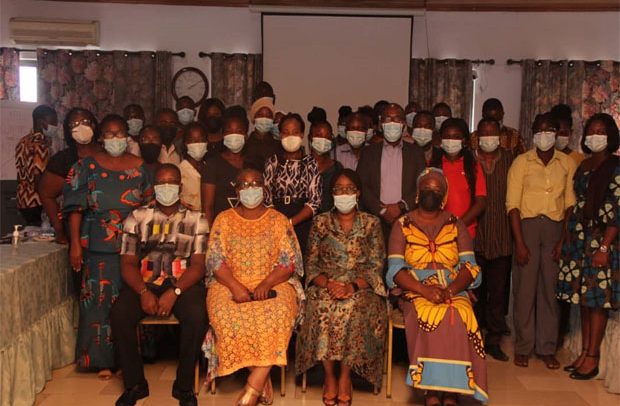The participants in a group picture
LAWA-Ghana Alumnae Incorporated (LAWA), a non-governmental organization working to promote women and children’s rights have sensitized stakeholders on the labour (domestic workers) regulations.
The workshop, attended by representatives from both public and private labour organizations, created the platform for participants to deliberate on an action plan and a road map for the prompt implementation of the law.
Resource person, lawyer Sheila Minkah-Premo, giving an overview of the Legislative Instrument (L.I 2408) said the engagement of domestic workers in homes is a common practice in Ghana usually done informally.
She also indicated that now, the rights of all category of workers have become recognized and is protected, as enshrined in the Labour Act, 2003 (Act 651) of the 1992 Constitution.
“In exercise of the power conferred on the Minister responsible for labour by section 174 of the Labour Act, 2003, (Act 651) the Labour (Domestic Workers) Regulations, 2020 (L.I 2408) was made on 11th day of June 2020… to protect the rights of domestic workers (DW) and define the employment relationship between a domestic worker and the employer of that worker,” she said.

Lawyer Shiela Minkah-Premo
Lawyer Minkah-Premo said the L.I. has 22 regulations which cover among others the contract of employment, wages and benefits, rest periods, leave periods and public holidays rights at work.
It also addresses the issue of termination of the contract of employment, monitoring and compliance, miscellaneous provisions, training skills development of workers, healthcare including pre-employment and post-employment medical exams.
“Provision is made for lodgment of contracts with the District Labour Officer within one month and the District Labour Officer is to maintain a Register for contracts of employment and to make it available for inspection. Domestic workers cannot be paid less than the daily minimum wage. Benefits-in-kind have to be stated as well as its quantum,” she added.
She however indicated that the passage of the L.I. is not enough adding that the Labour Act needs to be amended to give better protection to domestic workers since some of its provisions limit their rights.
“For example – Section 44 of the Labour Act excludes Domestic Workers from rest periods in the law and this is unfair and should be reviewed.
Section 175 of the Labour Act, 2003, (Act 651) defines Domestic Worker to mean “…a person who is not a member of the family of a person who employs him or her as a house help.” This excludes a family member providing services in the domestic setting from qualification as a domestic worker.” This definition is limiting and should be expanded looking at ILO Convention 189,” she advocated.
Also, she observed that there are several children aged 15 to 18 in this industry and “we also need a law to protect them.”
Lawyer Minkah-Premo said L.I. 2408 has very important provisions and requires monitoring to ensure compliance.
“The District Labour Office should be poised and resourced to monitor and see to its enforcement.
The contract LAWA developed provided the details included in the L.I. and also made provision for a passport picture but the L.I. law does not make room for this and this a gap since security is important so it should be included,” she added.
LAWA Coordinator, Barbara Ayesu said the NGO undertook a fact-finding mission with some university students in 2002 on the rights of domestic workers and came up with a report in 2003 titled: “Last to Sleep and First to rising” which identified some of their challenges with recommendations.
“We realized that there are a lot of females, adults and children in this industry. We also identified several problems they encounter in the workplace including Lack of contracts with terms of engagement spelt out, low wages etc.,” she said.
She said the findings also revealed that employers of domestic workers stood to violate the Labour Law and other laws if steps are not taken to formalize the industry.
She noted that with the regulation in place, stakeholders needed to be educated for smooth implementation, hence the workshop.
By Jamila Akweley Okertchiri


